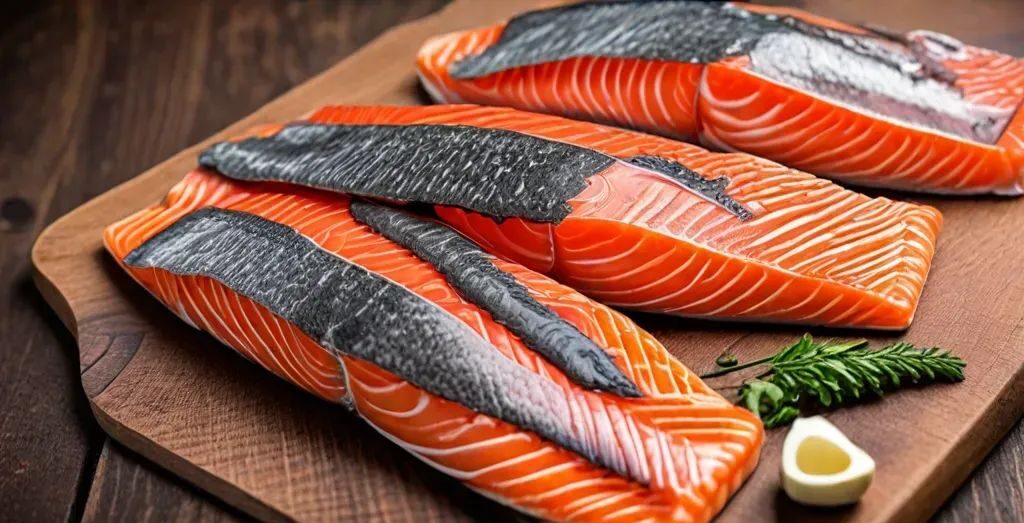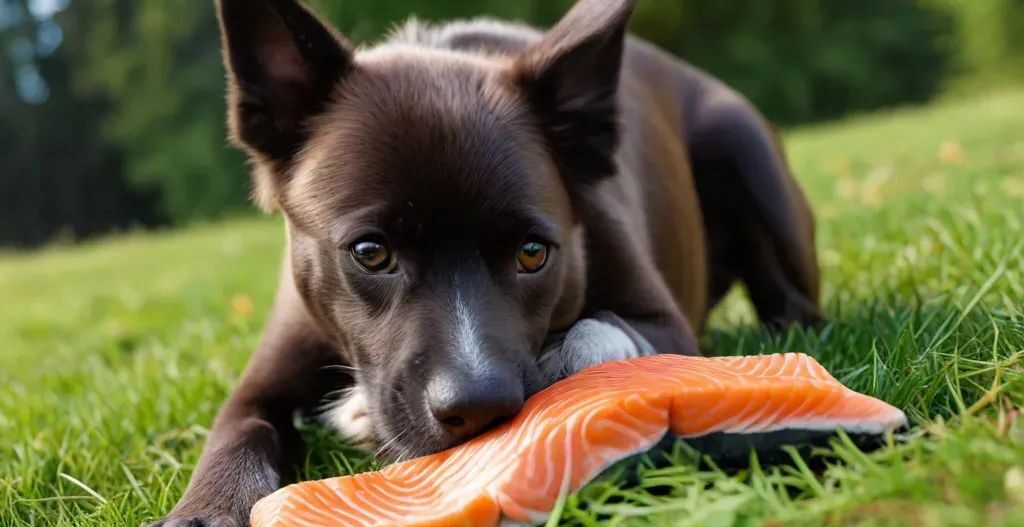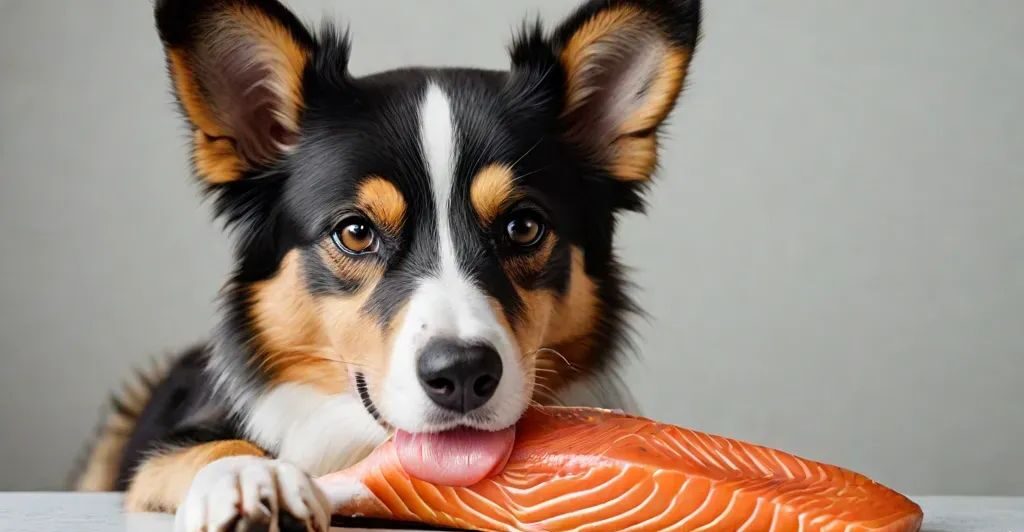- Homepage
- Dogs Nutrition
- Can Dogs Eat Salmon Fish Skin? 10 Powerful Nutrients in Salmon for a Healthier Dog
Can Dogs Eat Salmon Fish Skin? 10 Powerful Nutrients in Salmon for a Healthier Dog
Table of Contents
ToggleCan Dogs Eat Salmon Fish Skin?
Can Dogs Eat Salmon Fish Skin? Yes, dogs can eat salmon fish skin, but it must be prepared properly to ensure it is safe and beneficial for your furry friend. When cooked and served in moderation, salmon skin can be a nutritious addition to your dog’s diet. However, there are several considerations to keep in mind to avoid potential health risks.
Importance of a Balanced Diet in Dogs:
A proper and well-balanced diet is necessary for the overall dogs’ health and for the well-being of dogs. It ensures they receive the necessary nutrients to support their growth, energy levels, immune system, and organ function. A well-rounded diet typically includes a mix of proteins, carbohydrates, fats, vitamins, and minerals. While incorporating treats like salmon skin, it’s essential to maintain this balance to prevent nutritional deficiencies or excesses.
What Is Salmon?

Salmon is a widely enjoyed fish recognized for its robust taste and impressive nutritional benefit. Found in both the Atlantic and Pacific oceans, it is a staple in many human diets due to its health benefits. Salmon is prized for its high omega-3 fatty acid content, which offers numerous health benefits for both humans and dogs.
Nutritional Value of Salmon for Dogs:
Salmon is an excellent source of protein and omega-3 fatty acids, which are essential for a dog’s health. These nutrients support skin and coat health, reduce inflammation, and promote heart health. Additionally, salmon contains vitamins B12 and D, selenium, and other vital minerals. When including salmon or its skin in your dog’s diet, it provides these valuable nutrients that can enhance their overall health.
Nutritional Benefits of Salmon for Dogs:
Salmon is a highly nutritious option for dogs, offering a variety of health benefits:
- High-Quality Protein: Salmon provides a rich source of protein, essential for muscle development and repair.
- Omega-3 Fatty Acids: These healthy fats support skin and coat health, reduce inflammation, and promote heart health. Omega-3s also aid in brain development and cognitive function.
- Vitamins and Minerals: Salmon is packed with essential vitamins such as B12, which supports nervous system function, and vitamin D, which is crucial for bone health. It also contains selenium, a powerful antioxidant that helps protect cells from damage.
- Amino Acids: Essential amino acids in salmon support various bodily functions, including tissue repair, immune function, and the production of enzymes and hormones.
- Low in Saturated Fats: Compared to other meats, salmon is relatively low in saturated fats, making it a healthier protein choice for dogs.
- Boosts Immune System: The nutrients in salmon help strengthen the immune system, enhancing overall health and resilience against diseases.
By incorporating salmon into your dog’s diet, you can provide these valuable nutrients that contribute to their overall well-being and health.
Potential Risks of Feeding Salmon Fish Skin to Dogs
Feeding salmon fish skin to dogs can pose several risks if not handled properly. Here are some potential concerns:
- Parasite Infection: Raw salmon skin can harbor parasites like Nanophyetus salmincola, which carry the Neorickettsia helminthoeca bacteria responsible for salmon poisoning. This disease can cause severe gastrointestinal distress and can be fatal if not treated promptly.
- Bacterial Contamination: Raw fish skin may contain harmful bacteria such as Salmonella or Listeria, which can lead to food poisoning in dogs. These bacteria can Produce symptoms e.g. vomiting, diarrhea, and fever.
- High Fat Content: Salmon skin is high in fat, which can contribute to obesity and pancreatitis in dogs if fed in large amounts. Excessive fat can lead to digestive issues and other health problems.
- Possible Allergens: Some dogs may have allergies or sensitivities to fish or specific proteins found in salmon skin. This can result in allergic reactions, including itching, rashes, or gastrointestinal upset.
- Bone Fragments: Although less common, salmon skin may contain small bones that can pose a choking hazard or cause injury to the dog’s digestive tract.
- Additives and Seasonings: Salmon skin prepared with seasonings, sauces, or other additives (such as basil, grits, or cilantro) can be harmful to dogs. Ingredients like salt, garlic, and onions are toxic to pets.
- Overconsumption Risk: Even if salmon skin is cooked and free from contaminants, feeding too much can lead to imbalanced nutrition and excessive calorie intake, disrupting your dog’s overall diet.
- Digestive Issues: Some dogs may have difficulty digesting fish skin, leading to gastrointestinal upset, including diarrhea or constipation.

What Causes Salmon Poisoning in Dogs? Can Dogs Eat Salmon Fish Skin
Salmon poisoning in dogs is caused by a parasite known as Neorickettsia helminthoeca, which is found in certain types of raw fish, particularly salmon, trout, and other freshwater fish in the Pacific Northwest region of the United States. Here’s how the process works:
- Parasite Infection:
The Neorickettsia helminthoeca parasite is transmitted by a flatworm, also known as a fluke, called Nanophyetus salmincola. When dogs consume raw or undercooked fish infected with these flukes, they ingest the parasite
- Transmission: Once inside the dog’s digestive system, the flukes release the Neorickettsia helminthoeca bacteria, which then infect the dog.
- Symptoms Development: The bacteria multiply and spread throughout the dog’s body, leading to symptoms of salmon poisoning, which include:
- Vomiting
- Diarrhea (which may be bloody)
- Fever
- Lack of appetite
- Lethargy
- Swollen lymph nodes
- Serious Complications: If left untreated, salmon poisoning can be fatal within a couple of weeks. It is a serious condition that requires prompt veterinary attention.
Safely Incorporating Salmon Skin in Your Dog’s Diet
To safely feed your dog salmon skin, follow these guidelines:
- Cook the skin thoroughly to eliminate any harmful parasites or bacteria.
- Remove any bones that might be present in the skin.
- Serve in moderation to avoid excessive fat intake.
- Avoid seasonings and additives that could be harmful to your dog. By taking these precautions, you can safely include salmon skin as an occasional treat in your dog’s diet.

Alternatives to Salmon Skin for Dogs: Can Dogs Eat Salmon Fish Skin
If you’re looking for alternatives to salmon skin, consider fish oil supplements, which are rich in omega-3 fatty acids and can be easily added to your dog’s food. Cooked fish fillets, such as trout or sardines, are also excellent options, providing essential nutrients without the high fat content of salmon skin. Additionally, nutrient-rich vegetables like carrots, green beans, and even sushi okra can serve as healthy, low-calorie treats. Lean meats like chicken or turkey offer the necessary protein while avoiding the potential risks associated with high-fat content. For a different texture and flavor, you can also try incorporating small amounts of grits, ensuring they are plain and unseasoned, to add variety to your dog’s diet.
| Alternative | Nutritional Benefits | Preparation Notes |
|---|---|---|
| Fish Oil Supplements | Rich in omega-3 fatty acids, support skin and coat health | Add to your dog’s food as per dosage |
| Cooked Fish Fillets | High in protein and essential nutrients | Ensure bones are removed, serve plain |
| Vegetables | Low-calorie, nutrient-rich options like carrots, green beans, and sushi okra | Serve cooked or raw in appropriate sizes |
| Lean Meats | Provide necessary protein without high-fat content | Cooked thoroughly, served plain |
| Grits | Offers a different texture and flavor, low in fat | Serve plain and unseasoned, in moderation |
Can Dogs Eat Raw Salmon?
No, dogs should not eat raw salmon. Raw salmon can contain harmful parasites and bacteria that can lead to serious health issues, such as salmon poisoning disease. Always cook salmon thoroughly before feeding it to your dog to ensure it’s safe.
Can Dogs Eat Canned Salmon?
Yes, dogs can eat canned salmon, but it’s important to choose the right type. Opt for canned salmon packed in water without added salt or other seasonings. Avoid canned salmon with ingredients like basil, grits, okra, baked beans, and cilantro, as these can be harmful or unnecessary for dogs.
Final Thoughts: Can Dogs Eat Salmon Fish Skin
In conclusion of can dogs eat salmon fish skin? Yes, they can but it must be prepared properly to ensure it is safe and beneficial. When cooked thoroughly and served in moderation, salmon skin can be a nutritious addition to your dog’s diet, providing essential omega-3 fatty acids, protein, and various vitamins and minerals. However, raw salmon skin poses risks due to potential parasites and bacteria, and excessive fat intake from too much salmon skin can lead to health issues like pancreatitis or obesity.
When incorporating salmon skin into your dog’s diet, ensure it is free from harmful seasonings and additives. Alternatives like fish oil supplements, cooked fish fillets, nutrient-rich vegetables, lean meats, and plain grits can also offer similar nutritional benefits while providing variety.
Always prioritize your dog’s health and consult with your veterinarian before making significant changes to their diet. With the right approach, you can safely and effectively include salmon skin as a tasty and healthy treat for your furry friend.
FAQS: Can Dogs Eat Salmon Fish Skin
- Is it safe for dogs to eat salmon skin?
Yes, it can be safe if cooked thoroughly and fed in moderation, but raw salmon skin poses risks like parasites and bacteria. - How much salmon can I give my dog?
Limit salmon to 1-2 times a week, with portions depending on your dog’s size and dietary needs. - Are fish skins digestible for dogs?
Cooked fish skins are generally digestible for dogs, but excessive amounts may cause digestive issues. - Can I eat salmon skin?
Yes, salmon skin is safe for humans to eat and can be quite nutritious when properly cooked. - Is salmon digestible for dogs?
Cooked salmon is digestible for dogs and provides beneficial nutrients, but raw salmon should be avoided due to the risk of parasites. - What is the best fish for dogs?
Salmon, trout, and sardines are excellent choices due to their high omega-3 fatty acids and low levels of contaminants. - Can I boil salmon for my dog?
Yes, boiling salmon is a good way to cook it for dogs, ensuring it is free from parasites and safe to eat. - Is salmon better than chicken for dogs?
Salmon offers unique benefits like omega-3 fatty acids, but chicken is also a good protein source; variety and balance are key in a dog’s diet.

Jahanzaib Kaleem is a passionate and knowledgeable pet writer and veterinarian dedicated to enhancing the well-being of pets and educating pet owners around the world. With years of experience in veterinary medicine and a deep love for animals, Jahanzaib combines his medical expertise with a flair for writing to deliver insightful and practical advice on pet care.






3 COMMENTS